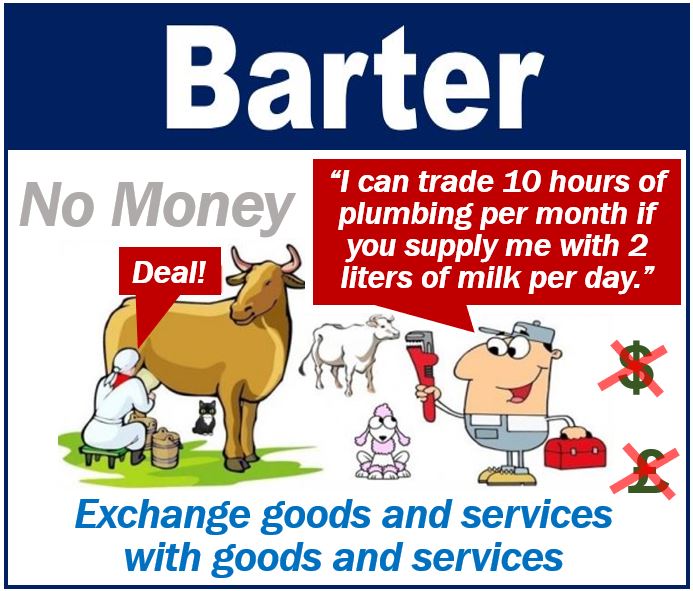Barter is the exchange of products and services for other products and services. In a barter system, people do not use money for transactions. The verb ‘to barter’ means to exchange goods and services for other products and services.
To barter can also mean to try to get a seller to reduce his or her price. In other words, it may mean ‘to haggle‘ or ‘to bargain.’ For example, I may say “She bartered with the street vendor and eventually got the second-hand watch for just $5.” That means she negotiated the price and managed to get a good reduction.
Barter system uncommon today
In today’s advanced economies, barter generally only exists to a very limited extent parallel to monetary systems.
During a monetary crisis, some people may prefer to exchange goods rather than use money.
For example, if a currency becomes unstable, a farmer may prefer to trade milk for plumbing work rather than cash.

Etymology of ‘barter’
Etymology is the study of where words came from, i.e., their origins. It also includes the study of how the meanings of words have evolved.
With the meaning “to trade by exchanging one commodity for another,” the term emerged in the mid-fifteenth century. It came from the Old French word Barater, which meant “to cheat, barter, deceive, haggle.” The Old French word also meant “to have sexual intercourse.“
The connection between ‘cheating’ and ‘trading’ exists in many different languages.
The noun, with the meaning “act of exchanging, commerce by exchange of commodities,” emerged in the 1590s. It came directly from the verb.
Barter system – brief history
Bartering dates back a long way; as far back as 6000 BC, and probably earlier. Mesopotamia tribes introduced the system, which the Phoenicians later adopted.
International trade, during Phoenician times, involved the exchange of goods and commodities rather than money.
The Babylonians exchanged goods for spices, weapons, tea, and food.
Roman soldiers were paid with salt. Whether that was bartering, if people used salt as a currency, is debatable. If a commodity becomes popular for trading goods and services, it has become a form of money.
During the Great Depression in the 1930s, many people had little or no money. They would, therefore, exchange food, for example, for services. One person would receive some food in exchange for one hour’s worth of gardening or cleaning.
Barter system – prisons
Prisoners tended to use specific goods such as cigarettes to purchase things. In an article in The Guardian, Tony Thompson explains that noodles have replaced tobacco in US prisons as the most popular bartering commodity.
British prisoners, on the other hand, tend to prefer other foods, including tuna fish. Prisoners who like bodybuilding, especially, love tuna fish.
Tobacco left the barter system
When cigarettes were banned at federal penitentiaries in the USA, their value as a barter commodity vanished. In many other advanced economies, tobacco products have lost their value for the same reason.
In a Wired article, Ben Paynter explains that mackerel, instant coffee, and postage stamps are popular in US prisons. Combination locks are also popular.
Regarding a combination lock, Paynter writes:
“Use keeping stuff secure. Plus, you can put it inside a sock to make a weapon.”
Barter system in Venezuela
Venezuela is in the middle of a disastrous economic crisis. Inflation has exceeded one million percent. People have lost faith in the Bolivar, Venezuela’s currency. Inflation refers to price rises. If inflation is at 1,000,000%, it means one million percent per year.
Consequently, bartering has become popular, and in many cases, the only way to buy things.
In a Reuters article, Andreina Aponte explains that fishermen there stopped selling their fish for money. They resorted to swapping snappers, for example, for rice, cooking oil, and bags of flour.
